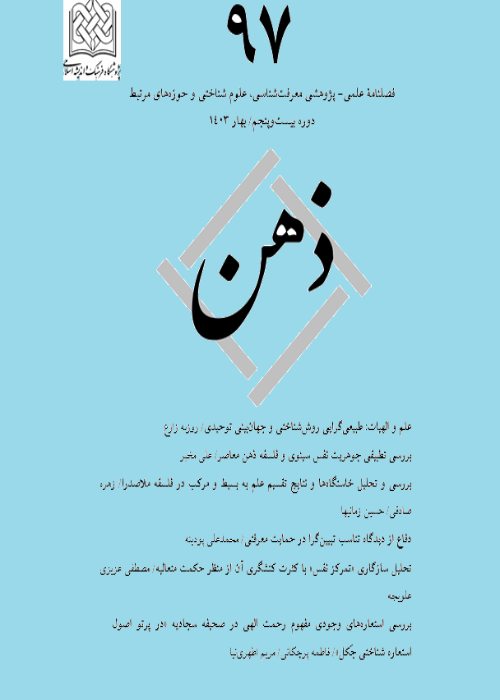The Role of Avicenna’s Teleology in Explaining Consciousness by Nigel’s Method
In The Mind and Cosmos, Thomas Nigel argues that naturalism has failed to provide a complete explanation of the universe. Main of Nigel's objections to naturalism are the issues that arise in explaining the mind through a naturalistic view. Naturalism has so far failed to provide a complete explanation that includes mental phenomena, especially the quality of consciousness. Nigel's proposition is that a more complete explanation of existence of all aspects such as consciousness can be given by taking a metaphysical view, similar to that which existed in Aristotle's teleology. In this article, it will be said that Aristotle's theory is not enough to solve this and the problem can be solved by taking Avicenna's teleology.
Nigel opposes the extremist view of explaining the universe as such a naturalist do. In The Mind and the Cosmos, Nigel presents his critique of naturalism from the point of view of mind-related issues, including consciousness, values, and cognition. The reason for the inability of naturalism to provide a complete explanation of the universe from Nigel's point of view is that it uses tools designed for quantitative measurements; when something like consciousness has a qualitative nature. Nigel's argument for the flaws of naturalism is as follows: 1- theory of naturalism necessarily needs to provide a comprehensive physical explanation of all the phenomena in the universe. 2- Consciousness is one of the phenomena of the universe. 3- Consciousness is a phenomenon that can’t be explained in the physical sciences. 4- Therefore, the theory of naturalism is not complete. Contrary to what naturalists think, complete explanation of universe must have order in matter from the beginning. Perhaps, Nigel thinks, in explaining consciousness as a part of universe, one can rely on ideas such as Aristotelian teleology which is related to the basic elements of the universe. Therefore, the end of the formation of the conscious man has been within matter from the beginning.
According to Aristotle, the end in natural affairs is something that has existed in an organism from the beginning. The apple tree has an end that is eternal. Such a view is inconsistent with the theory of evolution, which is of interest to scientists and Nigel. An important idea that Avicenna points out is that motion is raised in physics, and if we go to causality in metaphysics, go to existence. In the discussion of metaphysics, it is not like the physics of motion and change, but it means what exists or does not exist. The difference between the actual and the ultimate cause is a tool we can use to have complete explanation of the universe.
According to Aristotle, teleology is something that entered ontology because of its epistemological need, and therefore entered metaphysics from nature. But in his philosophical system, Avicenna discusses the end from a theological and metaphysical point of view and from there to physics. Therefore, with Avicenna's argument and his metaphysical approach, one can explain the emergence of consciousness in matter. He can believe on natural causes and evolution and hold teleological cause to explain the creation of consciousness from the ordered matter at the same time. In other words, the end intended in Avicenna's view can sum up with the natural history of the formation of species.
Teleology , Consciousness , Nagel , Avicenna , Aristotle , Naturalism
- حق عضویت دریافتی صرف حمایت از نشریات عضو و نگهداری، تکمیل و توسعه مگیران میشود.
- پرداخت حق اشتراک و دانلود مقالات اجازه بازنشر آن در سایر رسانههای چاپی و دیجیتال را به کاربر نمیدهد.



